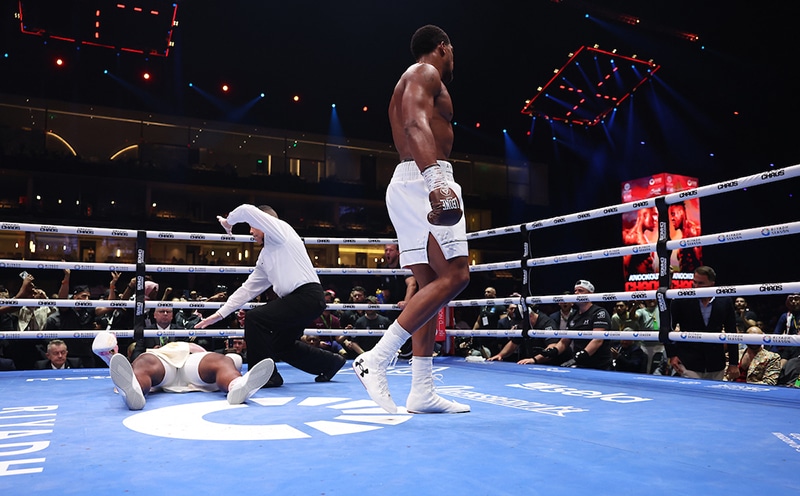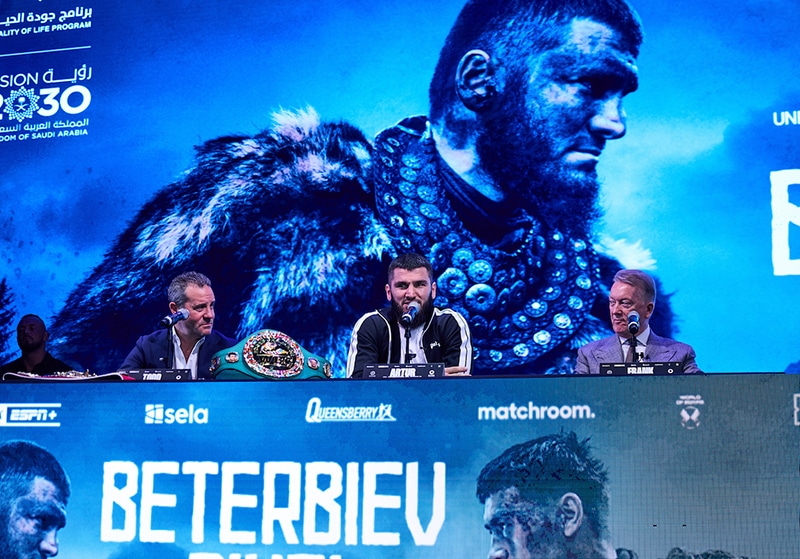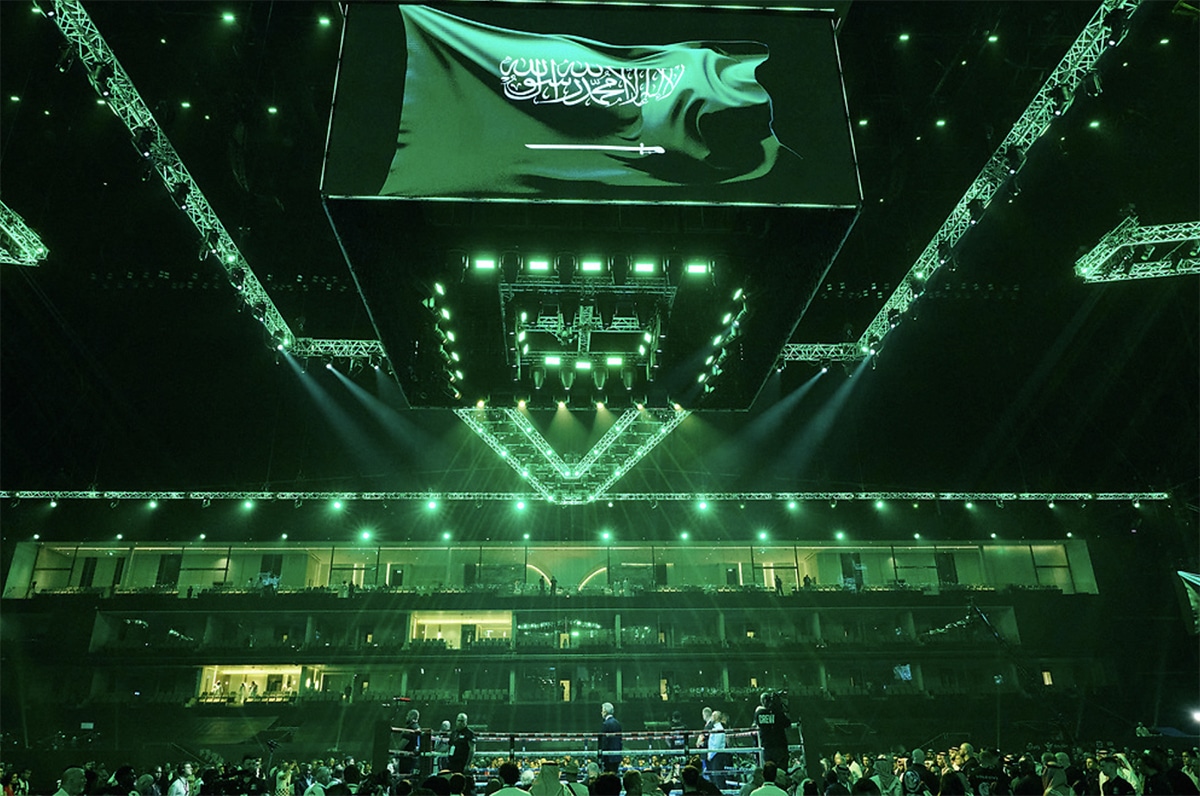The same nation that brought the controversial LIV Golf Tour to professional sports is reportedly now proposing a similar takeover of professional boxing.
How realistic is a LIV Boxing Tour? And is it good or bad for boxing?
Before you decide, we all need to read the fine print.
The Reuters News Agency broke news this week that the Saudi Public Investment Fund (PIF), the parent organization of the Saudi General Entertainment Authority run by chairman Turki Alalsheikh, is reportedly holding discussions with “multiple major boxing promoters” including UK-based Matchroom Boxing and California-based Golden Boy Promotions to create a single boxing ‘league.’
Elated fans and supporters pointed to the fight cards delivered by Saudi money over the past year. Detractors expressed concerns about the inevitable problems created by monopoly business operations.
As with everything, the devil is in the details. Fans imagining stand-alone tournaments like the World Boxing Super Series aren’t reading the fine print. In the United States, the proposition will smack right into the 1996 Professional Boxing Reform Act, and the 2000 Muhammad Ali Expansion Act.
How Would A Saudi Boxing League Work?

No details have been officially announced or discussed publicly, nor verified by anyone involved on the record. The Reuters report quotes an anonymous source saying the PIF would take a minority stake in a single joint venture with multiple boxing promotional organizations. That means the PIF would be part-owners of Matchroom Boxing or Golden Boy Promotions, for example.
Operating as SRJ Sports Investments, PIF would fold current operations into a single league designed to streamline boxing by driving more bouts and cards without the friction between promoters preventing top competitive matchups. The projected value of a new boxing league under this structure could be $5 billion.
Approximately 200 male boxers would be signed and assigned to fight in one of 12 weight classes, about 15 per group. Operators would determine the matchups and expect the athletes to fight on its schedule in high-profile events.
Fight cards would be staged by Sela, a Jeddah-based sports and entertainment production company. Sela staged the recent Fury vs. Usyk card and past Riyadh cards.
Assuming this description is correct, professional women boxers and prospects are excluded.
To get around the issue of boxers currently under contract with promoters like Matchroom and Golden Boy who are said to be in discussion with the Saudis, the Saudi government would take a minority stake in their businesses – and no doubt negotiate the right to dictate terms to the fighters willing to participate in the new league while still being tied to their current promoters.
No word about any other promoters being involved in discussions such as Premier Boxing Champions or Queensberry Promotions, or smaller promoters such as Boxxer, DiBella Entertainment, Salita Promotions, 360 Boxing Promotions, and Eye of the Tiger among the many.
The upcoming card headlined by Terence Crawford and Israil Madrimov in Los Angeles on August 3 and an anticipated card this fall at Wembley Stadium are the first cards held outside Riyadh, and will serve as beta-testing for the league.
If it sounds a lot like the mixed martial arts league Ultimate Fighting Champions, better known as UFC, you’ve got the idea. There are two significant legal differences.
First, UFC is a publicly traded, American based business in a capitalist system, governed by American laws.
Second, this kind of private monopoly is legally prohibited in the United States under two pieces of federal legislation, the 1996 Professional Boxing Reform Act and the 2000 Muhammad Ali Expansion Act.
A Saudi-backed boxing league would be owned by a monarchy, accountable to no one except the ruling family, currently led by the country’s crown prince and de facto ruler, Mohammed bin Salman.
MBS is eager to reshape Saudi Arabia’s image and develop new revenue sources before its oil export business fades due to reduced use of fossil fuels. Professional sports and tourism are among the opportunities the government is eager to embrace.
Boxing follows major investments by the PIF in Formula 1 auto racing, soccer, and the now infamous LIV Golf Series, which put a shock into the tradition-bound world of golf. It eventually led to a proposed merge of LIV with the existing golf circuit.
The deal is being held up by the U.S. Senate, which has expressed its concerns about the Saudi government using its massive treasury to “buy influence” in sports and engage in “sportswashing,” the practice of diverting attention away from Saudi Arabia’s poor record on human rights and environmental concerns.
“If sport washing is going to increase my GDP by way of 1%, then I will continue doing sport washing,” Bin Salman told Fox News last year.
As a reminder, Bin Salman is the man accused of ordering the 2018 assassination of Saudi dissident Washington Post journalist Jamal Khahshoggi. He was killed by agents of the Saudi government at the Saudi consulate in Istanbul, Turkey. Khashoggi was ambushed and strangled by a 15-member squad of Saudi operatives. His body was dismembered and disposed of by unknown means.
Alalsheikh has made no secret of the Saudi motivation. “There is big opportunity in boxing, but you must improve the market” said Alalsheikh in an interview with ESPN.
Plenty of Questions Remain
What will these 12 new divisions look like? In the UFC there are eight mens’ divisions. Boxing currently has 17 divisions, 18 if you count the WBC’s bridgerweight division.
Will the league follow the Association of Boxing Commissions (ABC) unified rules?
Will the current major sanctioning organizations (WBC, WBA, WBO, IBF) sanction these bouts? How will this work if you have a bout between two champions with belts in the current 17-division universe in what’s essentially a catchweight fight?
Will there be no more lineal, unified, undisputed, or RING Magazine champions?
Will there be full-time, mandatory drug testing?
What happens to the top fighters who choose not to participate?
What happens to smaller promoters? What happens to the development of young boxing talent?
Potential Impact of the Ali Act

How does a Saudi-backed boxing league operate under current American law? UFC operates as a monopoly because it is not subject to the 1996 Boxing Reform Act or the 2000 Ali Act.
Congressman Markwayne Mullin, a Republican representing Oklahoma, is a former MMA fighter who has attempted to expand the Ali Act to a broader range of fighters and sports, such as the UFC. So far, he hasn’t been successful. Dana White supports Donald Trump’s re-election in large part because Trump opposes this legislation.
The laws have three objectives: to ensure safety and promote the welfare of boxers by eliminating unjust exchanges, to aid commissions in regulating events and forming rankings, and to promote boxing whilst maintaining its integrity. They govern contract length, structures, and financial disclosures fighters must receive from promoters.
The laws aren’t always successful, but the sport would be far worse off without them.
UFC, PFL, and Bellator are monopolies which carefully guard information about finances and employ dubious contract clauses. One is the UFC’s Champions Clause, allowing the promotion to extend a deal by either a year or three bouts should an athlete fight out their agreement while holding a title. This is why Francis Ngannou infamously sat on the sidelines instead of defending his heavyweight title as ordered by the UFC when it insisted on extending his contract expiration date for a year.
Do Fighters and Fans Care?

Boxing has never been known for its high moral principles. Yes, some people within the sport try to do their best by the athletes and those who depend on the sport to make a living. These are the same people who recoil at the idea of getting in bed with a regime that still restricts the rights of women and LGBT citizens and levies draconian punishment on those who resist or exercise free speech to criticize its leaders.
As an American female journalist, I have three strikes against me and will never cross the Saudi borders to attend a boxing event staged there for my own safety. I’m not willing to gamble my life on this. According to Reporters Without Borders, 24 journalists remain in Saudi prisons in 2024.
I don’t begrudge any boxer doing what they can to score their biggest possible payday. Perhaps the Saudi boxing league follows the UFC model, avoiding any league cards on American soil. Like most monopolies, once it is in control, the big paydays will dwindle. Fighters will be under contract, and they’ll fight when the boss tells them to for the payment offered.
Top UFC fighters make more money than most of us can ever hope to earn. But there’s a reason so many of them are eager for a boxing payday when they can escape the control of the UFC. The monopoly they work for doesn’t pay them a fraction of what Canelo Alvarez, Tyson Fury, or Naoya Inoue earns.
I also get this: Western fans don’t much care. When news of this proposal emerged, American and British fans expressed elation at “the best fighting the best” and “fixing boxing” without much of a thought about how the sausage gets made. They also know the Saudis don’t do much to police PPV piracy, because the government doesn’t need to make any money from the broadcasts. The petrodollars have it covered.
Yes, boxing needs to be fixed. But not by a royal family backed by oil money. Boxing needs a single commission, a mandatory health care program for participants, a minimum pay scale if not a player’s union, a pension system, and a single champion. A restrictive league with its own rules will quickly lose its luster, just like the 54-hole, three-day golf tournaments under the LIV system.
Instead, hand over the reins of boxing to Jake Paul. Paul is an unabashed capitalist who knows how to make money. Paul loves the sport and understands its culture. He’s a good boss who pays his fighters well and is repaid by their loyalty. He knows treating workers well makes them give their best back in return.
This juggernaut might become inevitable. Let’s at least ask the tough questions and press for the answers. But maybe you won’t care until the Saudis come for the NBA and NFL, and they will.

